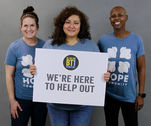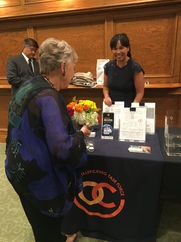VICTIM SERVICES
"I'm more confident in myself now. I feel like I'm not hiding in a corner anymore." - Survivor
Waymakers and The Salvation Army help lead the victim services component of the Orange County Human Trafficking Task Force in providing assistance to all those who are identified as victims of human trafficking in Orange County. Since 2004, the Orange County Human Trafficking Task Force has assisted over 1,037 victims from 43 countries, including the United States.

EMERGENCY VICTIM ASSISTANCE
Once victims are identified in Orange County, referrals for aftercare assistance can be made to access available emergency services in the human trafficking victim services program. These short-term emergency services may include food, clothes, housing, transportation, legal needs and mental health services. The partnering victim service providers use a victim-centered and trauma-informed approach in working alongside victims to address their acute emergency needs, advocating on their behalf in a space where they feel powerless, and help be a voice of reason as they walk on the razor's edge.
COMPREHENSIVE CASE MANAGEMENT
Comprehensive case management is client-driven individualized case management plans to help the client work towards self-sufficiency and independent living. The aim is to move survivors forward in life, from crisis to thriving in measurable areas of progress, as well as strengthen areas that made them vulnerable to trafficking. It is voluntary participation in these services and to continue with longer-term program support beyond emergency needs, clients need to make the necessary steps to follow-through with their own self-determined goals. Victims of human trafficking often do not have a healthy support system for help through trauma related behaviors or problem-solving through the everyday challenges of life. Recognizing this need of support is important to help empower clients to regain control of their life's decisions again. We do not want to be their hero. We want them to be their own hero. The case management support services still needs to be related to the case, their human trafficking circumstances and its barriers.


CRIMINAL JUSTICE ADVOCACY
Under California Marsy's Law, victims of crime are entitled certain rights, which includes having a Victim Advocate to help navigate the stressful process of the criminal justice system as cases are investigated and prosecuted. The County of Orange's designated victim service provider approved by the Orange County Board of Supervisors is through non-profit organization Waymakers. Waymakers has been working with victims of crime since 1978, opening first at the West Justice Center. Currently, over 100 Victim Advocate professionals provide assistance throughout all of the court centers and police departments in Orange County. Specialized victim services units include: sexual assault, gangs, homicide, domestic violence, and human trafficking.
SUPPORT SERVICES
Using a holistic approach of healing, support services are typically non-traditional services and donations provided by volunteers, faith-based organizations, and the community to help with gaps in the service areas of emotional health, coping skills, employment, celebrations, education, life-skill building and other types of resources that help clients with community reintegration and community belonging. Collaboration in support services can be a one-time assistance such as hosting a self-defense class by Gracie Barra Anaheim or established partnerships with Eastside Church for social support needs and International Sanctuary for employment opportunities in a safe work environment.


HOUSING PROGRAMS
Limited housing options is a real challenge for a homeless and transient victim population with no financial income. We are fortunate that through the years our community partners have opened up their domestic violence and youth shelter programs to help serve human trafficking victims. In addition, The Salvation Army and Orangewood Foundation took the extra steps needed to create specialized human trafficking housing programs. It takes into consideration additional factors that may cause trauma triggers and coping care needs exhibited by survivors who lived under situations of control and punishment. The need for less rigid house rules with punitive measures, and more around safety guidelines and responsible decision-making are emphasized.

















